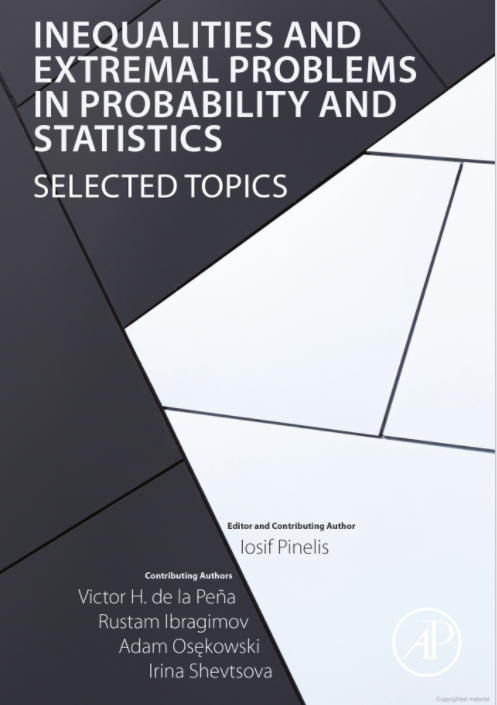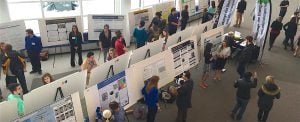 Iosif Pinelis published the paper, “An alternative to the Euler–Maclaurin summation formula: approximating sums by integrals only,” in Numerische Mathematik, Springer Nature Online First. The paper can be read on Springer SharedIt.
Iosif Pinelis published the paper, “An alternative to the Euler–Maclaurin summation formula: approximating sums by integrals only,” in Numerische Mathematik, Springer Nature Online First. The paper can be read on Springer SharedIt.
 Yang Yang is the principal investigator on a project that has received a $236,978 research and development grant from the National Science Foundation (NSF). The project is titled “High-Order Numerical Methods for Convection-Diffusion Equations with Unbounded Singularities.”
Yang Yang is the principal investigator on a project that has received a $236,978 research and development grant from the National Science Foundation (NSF). The project is titled “High-Order Numerical Methods for Convection-Diffusion Equations with Unbounded Singularities.”
This is a three-year project.
A book co-authored by Don Kreher, titled “Graphs, Algorithms, and Optimization,” Second Edition, has been selected for review by Choice, a journal for librarians. Only three books from the publisher’s entire mathematics and statistics portfolio have been chosen for review this year.
In January, Choice will select their Book of the Year from the books reviewed. The review of Kreher’s book, co-authored by William Kocay of the University of Manitoba, places it in nomination.
 Iosif Pinelis contributed two chapters, “On the nonuniform Berry—Esseen bound” and “On the Berry—Esseen bound for the Student statistic,” to the book “Inequalities and Extremal Problems in Probability and Statistics: Selected Topics,” just published by Elsevier’s imprint Academic Press. Pinelis is also the editor of the book.
Iosif Pinelis contributed two chapters, “On the nonuniform Berry—Esseen bound” and “On the Berry—Esseen bound for the Student statistic,” to the book “Inequalities and Extremal Problems in Probability and Statistics: Selected Topics,” just published by Elsevier’s imprint Academic Press. Pinelis is also the editor of the book.
The other contributing authors are V. de la Peña (Columbia University), R. Ibragimov (Imperial College London), A. Osȩkowski (University of Warsaw, Poland) and I. Shevtsova (Moscow University, Russia).
The Google preview of the book is available online through Google Books and Elsevier.
Also, Pinelis published the paper, “(Quasi)additivity Properties of the Legendre—Fenchel Transform and its Inverse, with Applications in Probability“, in the Journal of Convex Analysis 24 (2017), No. 3, online first.
 Min Wang is the principal investigator on a project that has received a $10,000 grant from the National Science Foundation. The project is titled, “Bayesian Inference in Statistics and Statistical Genetics.” This is a one-year project.
Min Wang is the principal investigator on a project that has received a $10,000 grant from the National Science Foundation. The project is titled, “Bayesian Inference in Statistics and Statistical Genetics.” This is a one-year project.
 The Undergraduate Research Symposium highlights the amazing cutting-edge research being conducted on Michigan Tech’s campus by some of our best and brightest undergraduate students.
The Undergraduate Research Symposium highlights the amazing cutting-edge research being conducted on Michigan Tech’s campus by some of our best and brightest undergraduate students.
The students showcasing their work today have spent a significant portion of the past year working alongside Michigan Tech faculty and graduate students to explore, discover and create new knowledge. They’ve spent long hours in the lab or out in the field designing experiments, gathering data, creating new models and testing hypotheses. They’ve applied their classroom knowledge in new and sometimes unexpected ways, and developed new skills that will propel them forward in their careers.
Anthony Marcich – Applied and Computational Mathematics
Title: Preliminary Work for Autochrome Photograph Reconstruction: Scanning and Processing Design
Advisor: Dr. Cecile Piret
Overview: Marcich goal is to use Radial Basis Functions methods (RBF) to construct smooth and accurate images from scans of these photographs. Their investigation of RBF requires processing scanned photos into nodes. They then described the initial scanning and processing work necessary to obtain these nodes.
E. Yasmine Walton-Durst – Mathematics
Title: Rayleigh–Bénard Convection in Michigan Tech’s Cloud Chamber – A Statistical Analysis of High Frequency Temperature Fluctuations
Advisor: Dr. Will Cantrell
Overview: Walton-Durst used time series analysis and other statistical methods to identify trends in temperature fluctuations from a second to several minutes. We hypothesize that data from the temperature sensors can provide a signature of the characteristic fluid movement within the chamber.
Madison Heeringa – Acutarial Science Mathematics
Title: Finding Structure in Data
Advisor: Dr. Benjamin Ong
Overview: Heeringa’s goal is to learn about and understand PCA and multi-scale PCA. Which will eventually be used to classify land and canopy cover in satellite images.
 Iosif Pinelis published the paper “An Involution Inequality for the Kullback-Leibler Divergence,” in Math Inequal Appl 20 (2017).
Iosif Pinelis published the paper “An Involution Inequality for the Kullback-Leibler Divergence,” in Math Inequal Appl 20 (2017).
In the National Science Foundation’s (NSF) latest rankings of universities by total research expenditures, Michigan Tech ranked 116th in the nation among public institutions and Tech’s atmospheric science and oceanography research ranked first in Michigan.
Nationally, atmospheric science research at Michigan Tech ranked 39th in research expenditures and oceanography ranked 53rd. Environmental science also ranked 53rd. Tech’s mechanical engineering research ranked 23rd in the nation, the highest ranking of all research fields at the University.
“Michigan Tech has been growing our capabilities in environmental science through our faculty hiring processes like the strategic faculty hiring initiative, our facility development efforts like the Great Lakes Research Center and in our equipment investments such as the cloud chamber in the Earth, Planetary, and Space Sciences Institute,” said Dave Reed, vice president for research. “NSF’s report reflects the impact of those investments and the significant research role that Michigan Tech is playing both nationally and within Michigan.”
The NSF report covered fiscal year 2015.
Other research areas at Tech that ranked in the top 100 nationwide include:
- Biomedical engineering, 96th
- Chemical engineering, 98th
- Civil engineering, 92nd
- Electrical engineering, 55th
- Mechanical engineering, 23rd
- Materials science and engineering, 61st
- Mathematical sciences, 75th
- Business and management, 73rd
- Humanities, 98th
- Visual and performing arts, 85th
The NSF report showed that research expenditures at Michigan Tech totaled $69.6 million for fiscal year 2015.
Professor Iosif Pinelis published the paper “Convex Cones of Generalized Multiply Monotone Functions and the Dual Cones” in Banach Journal of Mathematical Analysis, Volume 10, Number 4 (2016), 864–897. The abstract is available online.
Pinelis also published a paper, “Contrast Between Populations Versus Spread within Populations,” in Statistics and Probability Letters 121 (2017) 99–100. It is available until December 22, 2016 here.
 Qiuying Sha (Math/LSTI) is the principal investigator on a project that has received a $436,873 research grant from the U.S. Department of Health and Human Services, National Institutes of Health.
Qiuying Sha (Math/LSTI) is the principal investigator on a project that has received a $436,873 research grant from the U.S. Department of Health and Human Services, National Institutes of Health.
Shuanglin Zhang (Math) is the Co-PI on the project “Statistical Methods for Rare Variant Association Studies.”
This is a three-year project.
